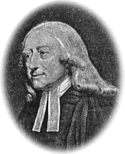Richard Watson (Methodist): Difference between revisions
m Reverted edits by 195.194.222.10 (talk) to last version by Cydebot |
top redir |
||
| Line 1: | Line 1: | ||
{{methodism}}'''Richard Watson''' ([[1781]]-[[1833]]) was a [[United Kingdom|British]] [[Methodism|Methodist]] theologian who was one of the most important figures in 19th century Methodism. |
{{for|the Rt Rev Richard Watson (1737-1816), Bishop of Llandaff|Richard Watson (bishop)}} |
||
{{methodism}} |
|||
'''Richard Watson''' ([[1781]]-[[1833]]) was a [[United Kingdom|British]] [[Methodism|Methodist]] theologian who was one of the most important figures in 19th century Methodism. |
|||
Watson was born in [[Lincolnshire]] and entered the Methodist itinerancy in 1796, serving as President of Conference in Britain in 1826 and as secretary to the Wesleyan Missionary Society from 1821 to 1825. In Britain, he was a leading [[Abolitionists|opponent of slavery]]. |
Watson was born in [[Lincolnshire]] and entered the Methodist itinerancy in 1796, serving as President of Conference in Britain in 1826 and as secretary to the Wesleyan Missionary Society from 1821 to 1825. In Britain, he was a leading [[Abolitionists|opponent of slavery]]. |
||
Revision as of 18:18, 1 June 2007
| Part of a series on |
| Methodism |
|---|
 |
|
|
Richard Watson (1781-1833) was a British Methodist theologian who was one of the most important figures in 19th century Methodism.
Watson was born in Lincolnshire and entered the Methodist itinerancy in 1796, serving as President of Conference in Britain in 1826 and as secretary to the Wesleyan Missionary Society from 1821 to 1825. In Britain, he was a leading opponent of slavery.
Watson was a gifted writer and theologian. In 1818 he wrote a reply to Adam Clarke's doctrine of the eternal Sonship of Christ; Watson believed that Clarke's views were unorthodox and, therefore, not faithfully Wesleyan. In 1823 he began to publish his Theological Institutes, which remained a standard for many years. It was the first attempt to systematize John Wesley's theology and by extension Methodist doctrine. In 1831 he wrote a well-regarded life of John Wesley.
Resources
- Theological Institutes by Richard Watson
- Sermon: The New Birth by Richard Watson
- Practical Divinity: Theology in the Wesleyan Tradition (1982) by Thomas A. Langford (ISBN 0-687-07382-0)
